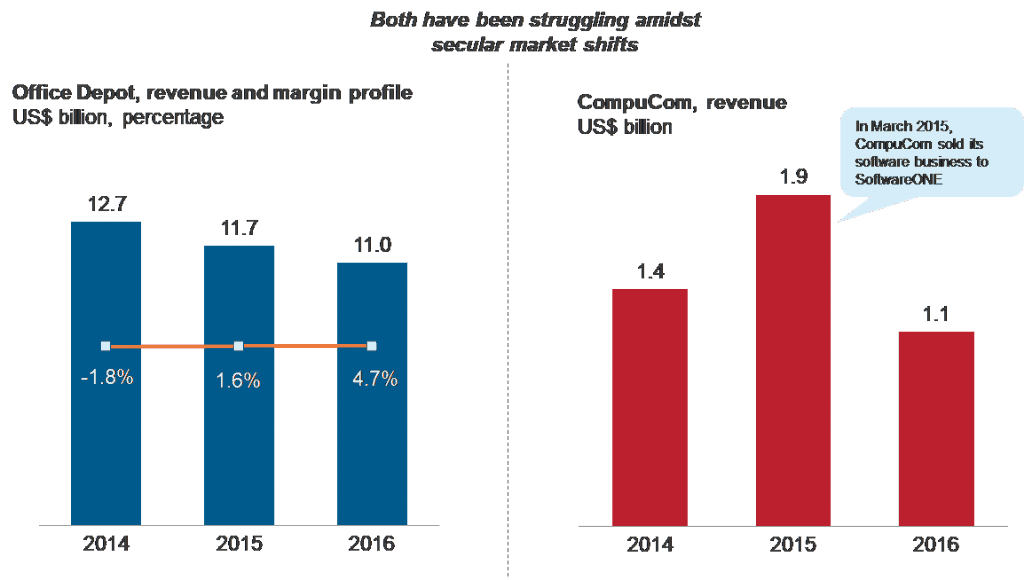
The adage, “Disruption does not discriminate,” rang true again with Office Depot’s acquisition of CompuCom last week.
The beleaguered office supplies retailer bought the IT infrastructure firm for US$ 1 billion, illustrating yet again the disruptive impact of Amazon and the digital economy. With this deal, Office Depot expects to add US$1.1 billion in revenue, and achieve cost synergies to the tune of US$40 million in two years. As part of the transaction, Thomas H. Lee Partners LP, the PE firm that owns CompuCom, will assume an 8 percent ownership in Office Depot.
The why
The deal comes at a time when Office Depot’s business is in the doldrums due to diminishing demand for traditional office supplies as offices go digital and online retailers eat into brick and mortar sales. CompuCom had its own share of problems, with four CEOs in the past four years, declining revenue, and diminishing investor confidence.
As the proposed takeover by Staples fell at the antitrust altar last year, Office Depot had been looking for ways to strengthen sales that had continued to slacken for several quarters. Its hiring of a slew of tech executives indicated that a drastic change was in the cards.
With this acquisition, Office Depot aims to pivot towards a business services and technology play in order to achieve:
- Superior value proposition: Provide a stronger story to customers around the “workplace ecosystem” for enterprises
- Cross-sell opportunities
- Leverage its “Last Mile” footprint to provide Tech-Zone help desks in Office Depot’s 1,400 retail locations, thus increasing CompuCom’s service-based opportunities
- Use the Tech-Zone help desks to increase on-premise traffic, thus driving traditional sales
- Topline growth from recurring revenue streams
- Synergies around the SMB market: Both companies target this highly fragmented market, with Office Depot’s omni-channel strategy offering access to nearly 6 million SMBs.
So, all ends well…right?
While the CompuCom acquisition is in line with the “Software Eats Everything” theme, meaningful questions exist:
- Uninspiring investor confidence: Office Depot’s share price dropped by 15 percent following the announcement. Although this can be considered a short-term consequence, both firms have struggled as secular market trends reshape their core industries. Will the combined entity realize its promised value?

- Digital innovation: There is little clarity on the combined entity’s innovation strategy around the digital workplace construct. The onus is on it, especially CompuCom, to deliver a value proposition centered on seamless customer experience
- The Amazon conundrum: With Amazon disrupting traditional business models – via e-channels and innovation across physical channels through concepts such as Amazon Go – the combined entity must chalk out a strategy to counter Amazon’s onslaught from both the retail and technology perspectives
- Change management: The combined entity needs to guard itself against organizational inertia, as the pivot from a brick and mortar model to a services play will require considerable structural changes and incentive restructuring
- Customer education: The combined entity must educate customers about its new value proposition and what it means for their business and their business as usual to assuage any concerns that lead to customer flight.
The way forward
There have been previous instances of retailers acquiring Managed Service Providers (MSPs) to enhance their value proposition and margins. This includes Staples’ acquisition of Thrive Networks in 2007, and Best Buy’s acquisition of mindSHIFT in 2011. Although worthy pursuits, these acquisitions failed due to executional fallacies, lack of a clear-cut strategy, and their erroneous belief that SMBs would choose them to outsource their IT in a managed services model.
On the other hand, most of CompuCom’s revenue comes from conventional project-based and procurement engagements. The customer experience point is important here. If Office Depot can make this model a de facto choice for customers looking for a better customer experience, this might just work.
That said, the continuous disruption by players such as Amazon and the proliferation of digital users who demand a personalized user experience across all channels will play a key role in determining the success of this acquisition.
Creating a definitive digital value proposition aligned to customer expectations and chalking out a clear, dynamic execution strategy are the key tenets Office Depot must embrace for the CompuCom acquisition to succeed. Indeed, they are our words to the wise for any service-related organizations considering M&A activity in today’s digitally-disrupted environment.
What is your take on Office Depot’s pivot? We would love to hear from you at [email protected] and [email protected]










